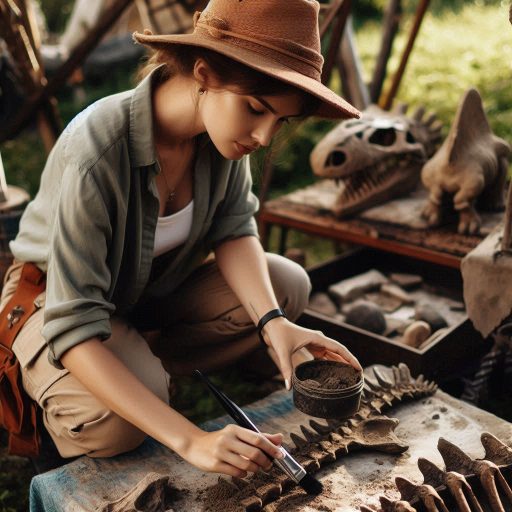Introduction
Education pathways play a crucial role for aspiring archaeologists.
These pathways guide individuals through the essential steps to enter the field.
A career in archaeology requires a solid educational foundation, including formal degrees and hands-on experience.
Understanding the past demands a mix of theoretical knowledge and practical skills.
Education equips future archaeologists with the tools they need to analyze artifacts, conduct excavations, and interpret findings.
Academic programs provide essential training in research methodologies, fieldwork techniques, and data analysis.
Additionally, education fosters critical thinking and problem-solving skills, which are vital for interpreting complex archaeological data.
With a strong educational background, aspiring archaeologists can effectively collaborate with interdisciplinary teams.
The importance of education extends beyond initial degrees.
Continuous learning through workshops, conferences, and online courses helps professionals stay updated on new technologies and methodologies.
By pursuing the right educational pathways, aspiring archaeologists can develop their expertise and passion for the field.
This knowledge empowers them to contribute significantly to understanding our cultural heritage.
Education is the foundation for a successful career in archaeology, enabling individuals to explore and preserve the stories of our past.
Educational requirements for becoming an archaeologist
Typical Educational Background Needed to Become an Archaeologist
Aspiring archaeologists must meet specific educational requirements to establish a successful career in the field.
A strong academic foundation provides essential knowledge and practical skills for understanding past cultures and analyzing artifacts.
Most archaeologists start their careers by earning a bachelor‘s degree.
A degree in archaeology, anthropology, or a related field is highly recommended.
Undergraduate programs introduce students to the core concepts of archaeology, including excavation techniques, cultural history, and artifact analysis.
Courses often cover ancient civilizations, research methods, and environmental studies.
These subjects equip students with the foundational knowledge they need to interpret archaeological evidence.
While a bachelor‘s degree is the minimum requirement, many professional archaeologists pursue advanced degrees.
Earning a master‘s or doctoral degree opens up more specialized career opportunities.
Graduate programs allow students to focus on specific areas of interest, such as bioarchaeology, prehistoric archaeology, or maritime archaeology.
These programs offer advanced training in excavation methods, data analysis, and field research.
With an advanced degree, archaeologists can lead excavation projects, teach at universities, or conduct independent research.
Importance of Having a Degree in Archaeology or a Related Field
In addition to formal education, practical fieldwork is crucial for becoming a skilled archaeologist.
Many degree programs include field school experiences, where students participate in excavations and learn to document their findings.
Field schools provide hands-on training in surveying, mapping, and artifact preservation.
This practical experience is essential for developing the skills necessary to work on archaeological sites.
The importance of obtaining a degree in archaeology or a related field cannot be overstated.
Archaeology is a multidisciplinary field that requires a deep understanding of history, anthropology, and science.
A degree ensures that archaeologists can apply scientific methods to their work and approach their research with a comprehensive perspective.
In many countries, a degree is also a requirement for obtaining professional certification and working on archaeological projects.
Furthermore, possessing a degree demonstrates a commitment to the profession.
Employers often seek candidates with formal education because it shows that the individual has been trained to conduct research ethically and professionally.
It also ensures that archaeologists can interpret data accurately and present their findings clearly.
Aspiring archaeologists must prioritize their education by earning a degree in archaeology or a related field.
Undergraduate degrees in archaeology
Different Undergraduate Programs Available for Aspiring Archaeologists
Aspiring archaeologists have several undergraduate programs to choose from that lay the foundation for a career in the field.
Most commonly, students pursue a bachelor‘s degree in archaeology, anthropology, or a related subject.
These programs offer a comprehensive introduction to the study of human history and prehistory through material remains.
A Bachelor of Arts (BA) in Archaeology often focuses more on the cultural and historical aspects of archaeology.
It emphasizes humanities-based approaches, studying how societies developed and evolved.
A Bachelor of Science (BSc) in Archaeology focuses on scientific methods.
It emphasizes lab work, environmental archaeology, and technical aspects of excavations.
Both options provide valuable training but emphasize different aspects of archaeological practice.
Some students opt for anthropology programs with a concentration in archaeology.
Anthropology degrees provide broader knowledge in understanding human cultures, behavior, and evolution.
This pathway often explores archaeology within a larger context of biological and cultural anthropology, providing students with a holistic view of human history.
These diverse program options allow students to tailor their education to their specific interests and career goals.
Coursework and Skills Gained in These Programs
Undergraduate archaeology programs offer coursework that provides essential skills and knowledge.
Core courses typically include subjects such as ancient civilizations, archaeological theory, and excavation techniques.
These courses equip students with a foundational understanding of human history and the scientific methods used in archaeological research.
Practical fieldwork courses are a significant part of most archaeology programs.
Students participate in field schools, where they learn excavation techniques, artifact recovery, and site documentation.
This hands-on experience is essential for gaining real-world skills in surveying, mapping, and handling archaeological materials.
Fieldwork also helps students develop problem-solving and teamwork skills, which are crucial in a professional archaeological setting.
Lab-based courses teach students to analyze and interpret artifacts.
Students learn how to examine pottery, tools, bones, and other remains to draw conclusions about past societies.
Lab work often involves using specialized equipment and software for analyzing artifacts, preparing students for the technological demands of modern archaeology.
Courses in archaeological theory teach students how to interpret findings within cultural, historical, and scientific contexts.
They explore how archaeologists form hypotheses about human behavior and societal development based on material evidence.
This coursework helps students develop critical thinking and analytical skills necessary for drawing meaningful conclusions from their research.
In addition, many programs offer specialized courses in areas like bioarchaeology, geoarchaeology, or maritime archaeology.
These courses allow students to explore niche areas of interest and develop expertise in specific fields.
They also offer opportunities to learn about emerging technologies and methodologies used in archaeological research today.
Undergraduate archaeology programs provide students with a strong foundation in both theoretical and practical aspects of archaeology.
From coursework to fieldwork, students gain the skills necessary to pursue a career in the study of human history through material remains.
Read: What Does a Geologist Do? Career Overview and Insights
Graduate degrees in archaeology
The Various Graduate Programs for Those Looking to Further Their Education in Archaeology
Graduate programs in archaeology offer opportunities for specialization and advanced training.
Aspiring archaeologists can pursue a Master‘s or Doctoral degree, depending on their career goals.
These programs provide in-depth knowledge and focus on research, fieldwork, and academic expertise.
Master‘s degrees in archaeology typically take two to three years to complete.
They offer students the chance to delve into specific areas, such as bioarchaeology, geoarchaeology, or classical archaeology.
Graduate students often choose a concentration based on their interests, such as prehistoric archaeology or cultural heritage management.
Master‘s programs emphasize advanced research skills, offering courses in data analysis, excavation techniques, and theoretical frameworks.
These programs also include a significant amount of fieldwork, allowing students to gain practical experience while conducting their own research projects.
Doctoral programs in archaeology are research-intensive and take five to seven years to complete.
A PhD program focuses on original research and preparing students for academic or high-level professional roles.
Doctoral students often contribute to the field by conducting groundbreaking research on specific archaeological sites or periods.
These programs require students to produce a dissertation based on their research, which can take years of study, excavation, and analysis.
Many PhD graduates pursue careers as professors, museum curators, or leaders in archaeological research projects.
Importance of Obtaining a Master‘s or Doctoral Degree for Career Advancement in Archaeology
Obtaining a Master‘s or Doctoral degree is essential for career advancement in archaeology.
While a bachelor‘s degree provides a foundation, advanced degrees offer specialized knowledge and skills that open up more opportunities.
A Master‘s degree enables archaeologists to tackle complex projects.
It allows them to lead excavations and qualify for advanced positions.
This includes roles in organizations, museums, and universities.
Graduate degrees also give archaeologists access to research grants and funding opportunities.
Many archaeological research projects require advanced degrees for leadership roles, as well as the ability to publish findings in academic journals.
A Master‘s or PhD is often a prerequisite for securing these grants, which are crucial for conducting large-scale excavations and analyses.
Furthermore, advanced degrees provide archaeologists with the expertise needed to teach at the university level, offering academic career paths.
Additionally, holding a graduate degree enhances an archaeologist‘s credibility and authority in the field.
Employers and academic institutions seek candidates with specialized knowledge and proven research abilities.
Graduate degrees give archaeologists more respect in their professional circles.
This respect enables collaboration on significant projects and contributes to the field’s advancement.
For those seeking career advancement, pursuing a Master‘s or Doctoral degree in archaeology is essential.
These advanced programs offer specialized training, research opportunities, and credentials for leading excavations.
They also help secure grants and make meaningful contributions to the field.
Read: Educational Path: Becoming a Geologist in the USA
Fieldwork experience
Significance of Gaining Hands-On Fieldwork Experience in Archaeology
Fieldwork experience is essential for aspiring archaeologists.
It provides hands-on learning and a practical understanding of archaeological techniques.
In the field, students develop critical skills that cannot be taught in a classroom setting.
Excavations, surveying, and artifact recovery are key components of archaeological research, and fieldwork is where students apply these methods.
Fieldwork allows students to understand the complexities of working on archaeological sites.
They learn how to carefully uncover artifacts, document findings, and analyze site features.
This experience builds technical proficiency, which is crucial for professional success in the field.
Additionally, fieldwork teaches students problem-solving skills, as archaeological digs often present unexpected challenges.
Participating in fieldwork also exposes students to the collaborative nature of archaeology.
Excavations require teamwork, communication, and cooperation.
Working closely with fellow students and professionals helps students learn how to contribute effectively to a project.
Building these interpersonal skills in a real-world environment prepares students for future careers in archaeology.
Furthermore, fieldwork offers students the chance to specialize in areas that interest them.
Whether working on ancient settlements, burial sites, or underwater excavations, students can gain experience in specific fields.
Specializing through fieldwork enhances an archaeologist‘s expertise and makes them more competitive in the job market.
Opportunities for Students to Participate in Archaeological Digs or Internships
Many universities and institutions offer opportunities for students to gain fieldwork experience through archaeological digs or internships.
Field schools are a popular option, providing structured learning environments where students participate in supervised excavations.
Field schools allow students to earn academic credit while gaining practical skills in excavation, artifact processing, and site management.
Also, field schools are often held at significant archaeological sites around the world, giving students a unique opportunity to work in different environments.
These programs typically last several weeks and provide hands-on experience in excavation, mapping, and documentation.
Students also learn essential techniques, such as stratigraphy and artifact conservation, which are vital to a successful archaeological career.
Internships are another valuable way to gain fieldwork experience.
Museums, cultural heritage organizations, and research institutions often provide internships for students.
These internships allow students to assist in archaeological research.
Students can also help with cataloging artifacts and conducting conservation work.
These internships give students insight into the behind-the-scenes work that goes into preserving and analyzing archaeological materials.
Internships also provide networking opportunities, helping students build connections with professionals in the field.
Additionally, some students may participate in volunteer digs, where they can gain experience without the structure of a formal program.
Volunteering allows students to contribute to real archaeological projects and hone their skills in a practical environment.
Whether through field schools, internships, or volunteer opportunities, gaining hands-on fieldwork experience is crucial for aspiring archaeologists.
Fieldwork experience is a fundamental part of archaeological training.
It provides students with practical skills, specialization opportunities, and the ability to collaborate on significant projects.
Read: Botany Career Fairs and Networking Events
Transform Your Career Today
Unlock a personalized career strategy that drives real results. Get tailored advice and a roadmap designed just for you.
Start Now
Specializations in archaeology
Different Areas of Specialization Within the Field of Archaeology
Archaeology offers various specializations, allowing professionals to focus on areas that align with their interests and skills.
Specializations include fields like underwater archaeology, bioarchaeology, and cultural resources management.
Each specialization provides unique opportunities to explore specific aspects of humanity’s past and its material culture.
Underwater archaeology focuses on submerged sites such as shipwrecks and ancient ports.
It involves the study of maritime history and artifacts found beneath oceans, lakes, and rivers.
This field requires specialized skills in diving and underwater excavation techniques.
Bioarchaeology, on the other hand, studies human remains to understand past populations’ health, diet, and lifestyles.
Bioarchaeologists analyze skeletal remains, teeth, and ancient DNA to gather insights into human evolution and migration patterns.
Another popular specialization is cultural resources management (CRM), which focuses on preserving and managing archaeological sites and cultural heritage.
CRM professionals collaborate with government agencies, developers, and private companies to protect archaeological sites during construction projects.
This field grows in importance as countries emphasize conserving historical and cultural assets.
Additional specializations include archaeobotany, which studies plant remains to understand ancient agricultural practices.
Zooarchaeology focuses on animal remains to examine past human-animal interactions.
These specializations allow archaeologists to delve into niche areas and contribute unique findings to the broader archaeological community.
Benefits of Specializing in a Specific Area, Such as Underwater Archaeology or Cultural Resources Management
Specializing in a particular area of archaeology provides several benefits, including increased expertise and career opportunities.
Specialists develop a deeper understanding of their chosen field, which makes them valuable contributors to research and excavation projects.
This expertise often leads to leadership roles in archaeological expeditions or research teams.
Specialization also enhances an archaeologist‘s ability to secure funding for research.
Grants and funding opportunities are often more accessible to archaeologists who demonstrate expertise in a particular field.
By focusing on underwater archaeology, for example, an archaeologist can apply for funding dedicated to marine and maritime history projects.
Similarly, specialists in bioarchaeology can receive grants to study ancient human remains and contribute to medical and evolutionary research.
Furthermore, specializing in areas like cultural resources management offers job security and flexibility.
CRM archaeologists often work in the public and private sectors, assisting with site preservation and compliance with heritage protection laws.
The demand for CRM professionals is growing, particularly in countries where infrastructure development intersects with archaeological preservation.
Specialization also allows archaeologists to make significant academic contributions.
Specialists often publish research findings in academic journals, advancing knowledge in their specific field.
Whether studying ancient shipwrecks or managing cultural heritage sites, specialists shape our understanding of the past in unique ways.
Choosing a specialization in archaeology offers numerous benefits.
It deepens expertise, enhances career prospects, and provides opportunities for meaningful contributions to the field.
Specializing allows archaeologists to focus on areas that resonate with their interests, making their work both rewarding and impactful.
Read: Preparing for a Botany PhD: Tips and Advice
You Might Also Like: Nuclear Scientist: Work-Life Balance
Professional certifications and licenses
Importance of Obtaining Certifications and Licenses in Archaeology
Certifications and licenses play a crucial role in an archaeologist‘s career.
They demonstrate a professional’s competence and adherence to industry standards.
Certifications validate an archaeologist’s skills, making them more competitive in the job market.
Employers often require certifications to ensure that professionals meet the necessary qualifications for excavation, analysis, and cultural resource management (CRM) work.
Licenses are equally important in archaeology, particularly when working on government or protected lands.
Many countries require archaeologists to hold specific licenses to lead or participate in excavations.
These licenses ensure that archaeological work complies with legal and ethical guidelines, especially when handling sensitive cultural heritage.
By obtaining the necessary certifications and licenses, archaeologists show their commitment to preserving history and following professional standards.
In addition to career advancement, certifications and licenses build trust with stakeholders.
Government agencies, private developers, and indigenous communities prefer to work with certified and licensed professionals.
These credentials demonstrate an archaeologist’s ability to manage projects responsibly and adhere to regulatory requirements.
They ensure the protection of archaeological sites and artifacts.
The Process of Obtaining These Credentials
The process of obtaining certifications and licenses in archaeology varies by region and specialization.
In the United States, for example, many archaeologists pursue certification through the Register of Professional Archaeologists (RPA).
To become certified, applicants must meet education requirements, such as holding a degree in archaeology or a related field, and demonstrate fieldwork experience.
Applicants must also agree to follow the RPA‘s code of ethics and professional standards.
This certification is often a prerequisite for leading archaeological projects and working in CRM roles.
In some regions, archaeologists must obtain specific licenses to conduct excavations.
For example, in the United Kingdom, archaeologists may need a license from local authorities to dig on protected heritage sites.
In the U.S., archaeologists working on federal lands must hold permits from government agencies like the Bureau of Land Management.
These permits often require applicants to demonstrate experience in managing excavations, handling artifacts, and ensuring site preservation.
Archaeologists can earn specialized credentials in areas like geophysical survey methods and conservation techniques.
They can also pursue underwater archaeology certifications alongside general credentials.
Specialized training programs and workshops offer these certifications, enabling professionals to gain advanced skills.
Many certifications require continuing education to remain valid, ensuring that archaeologists stay up-to-date with new methods and regulations.
Certifications and licenses are essential for professional archaeologists.
They provide credibility, open career opportunities, and ensure compliance with legal and ethical standards.
Aspiring archaeologists should actively pursue these credentials to enhance their expertise and contribute to the responsible preservation of cultural heritage.
Learn More: Geology Certifications and Professional Licenses
Continuing education and professional development
Importance of Continuing Education for Archaeologists
Continuing education is vital for archaeologists to stay relevant and excel in their careers.
The field of archaeology constantly evolves with new discoveries, methodologies, and technologies.
Archaeologists must keep their skills updated to remain competitive in this dynamic field.
Engaging in continuous learning allows professionals to improve their research, excavation techniques, and analytical skills.
It also helps them stay aware of ethical and legal developments that affect their work.
Additionally, continuing education supports career advancement.
Many employers and institutions value professionals who take initiative to enhance their knowledge and abilities.
By staying informed about the latest developments, archaeologists can position themselves for leadership roles, research opportunities, and higher-level projects.
Continuous learning also allows them to specialize in emerging areas of archaeology, such as digital archaeology or bioarchaeology, which can open new career pathways.
Beyond career growth, continuing education ensures that archaeologists contribute to the preservation of cultural heritage responsibly.
Education equips archaeologists to apply the latest preservation techniques.
It also helps them respect the cultural sensitivities of the communities they work with.
As new ethical considerations arise, ongoing education ensures archaeologists adhere to best practices in managing archaeological sites and artifacts.
Various Ways in Which Professionals Can Stay Current in the Field, Such as Attending Conferences or Workshops
Archaeologists have many opportunities to pursue continuing education.
Attending professional conferences is one of the best ways to stay current.
Conferences bring together experts to share the latest research findings, techniques, and technologies in the field.
By attending, archaeologists can gain new insights, network with peers, and explore emerging trends.
Conferences also offer opportunities to present one‘s own research, fostering professional development and recognition.
Workshops and training courses provide another avenue for continuous learning.
These programs often focus on specific skills, such as GIS mapping, artifact conservation, or advanced excavation methods.
Participating in workshops helps archaeologists refine their practical skills and adopt new technologies.
Many universities, professional organizations, and research institutions offer specialized training programs tailored to different areas of archaeology.
Online courses and webinars have become popular for continuing education, especially for those unable to attend in-person events.
These flexible learning formats cover various topics, including remote sensing techniques, cultural heritage management, and data analysis.
Online platforms allow archaeologists to learn at their own pace while earning certifications in specific areas.
Professional organizations also play a key role in continuing education.
Associations like the Society for American Archaeology (SAA) and the Archaeological Institute of America (AIA) offer access to journals and research papers.
They also provide valuable learning opportunities for their members.
Membership in these organizations connects archaeologists to a global community, offering mentorship, resources, and career advancement opportunities.
Continuing education is essential for archaeologists.
They attend conferences, workshops, and online courses to enhance their skills, stay competitive, and responsibly preserve cultural heritage.
Is there anything from this conversation you’d like me to remember for the future?
Showcase Your Business Today
Reach thousands of readers actively exploring professional services. Publish your business profile and grow your audience now.
Publish NowExplore Further: What Does a Climatologist Do? Career Insights
Conclusion
In this blog post, we explored various education pathways for aspiring archaeologists.
We discussed the importance of obtaining a relevant degree in archaeology or a related field.
Undergraduate and graduate programs provide essential knowledge and skills for a successful career.
Gaining fieldwork experience is crucial, as hands-on practice enhances theoretical learning.
We highlighted the significance of professional certifications and licenses, which validate skills and ensure compliance with legal standards.
Continuing education and professional development are vital for staying current in this evolving field.
Conferences, workshops, and online courses offer valuable opportunities for learning and networking.
Aspiring archaeologists should embrace these educational pathways to build a solid foundation in their careers.
Pursuing a degree, gaining field experience, and obtaining certifications are essential steps.
By engaging in continuous learning, professionals can adapt to new technologies and methodologies.
Finally, archaeology offers a fulfilling career that connects individuals to the past and preserves cultural heritage.
With dedication and passion, aspiring archaeologists can make meaningful contributions to our understanding of history.
Follow your passion for archaeology and embark on a rewarding journey of discovery and exploration.
[E-Books for Sale]
The Big Book of 500 High-Paying Jobs in America: Unlock Your Earning Potential
$19.99 • 500 High-Paying Jobs • 330 pages
Explore 500 high-paying jobs in America and learn how to boost your career, earn more, and achieve success!
See All 500 High-Paying Jobs of this E-Book
1001 Professions Without a Degree: High-Paying American Jobs You Can Start Now
$19.99 • 1001 Professions Without a Degree • 174 pages
Discover 1001 high-paying jobs without a degree! Unlock career tips, skills, and success strategies for just $19.99!




